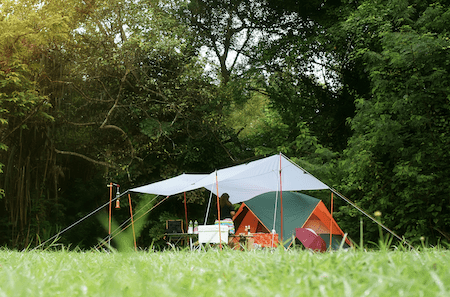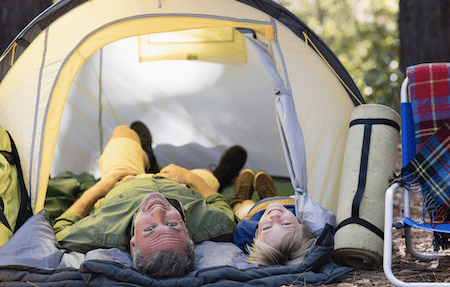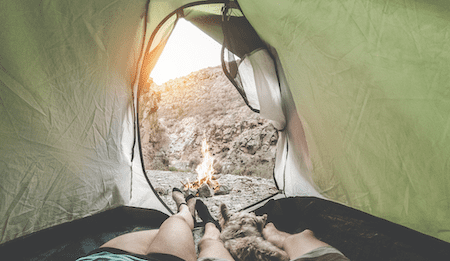Summer is the best time to go camping with friends and family.
It’s a great way to initiate family bonding time and experience the purge- the bliss of living in a place surrounded by nature and blocked out from the noise on the street of social media.
However, your camping experience might get ruined by something as trivial as the tent overheating.
It could birth sleep deprivation, potentially destroying your mood all through the trip.
With no civilization in the woods, let’s show you how to cool a tent without electricity. Keep reading.
15 Ways To Cool A Tent Without Electricity
Packing up and camping in the woods is a great way to escape the craziness attached to civilization and advancement in technology.
It’s a great way to shut out the noise and reconnect with your inner self.
So, it’s expected that you’d want to do things the old-fashioned way while keeping electric devices at arm’s length.
However, ridding yourself of electricity and electric devices won’t stop the tent from overheating.
Luckily, there are different methods you can try to cool your tent without electricity.
Let’s check them out.
#1. Choose Your Location Wisely

But first, research your camping site. It keeps you informed about the physical qualities of the site.
Ask questions like, is it an open space without trees around? Does nature surround it with more than enough shades to pitch your tent under?
Frankly speaking, if the camping site is an open space like a beach, you’re in for a severe overheating summer.
The reason is that your tent would mostly absorb the sun rays, overheating in return.
So, when you’re shopping for the perfect camping site for you and your loved ones, look out for areas with shades that hide your tent from the sunlight.
Also, look out for areas with enough wind. Campsites with rivers, lakeside, and waterfalls are a great option too. The river is a source of fresh air.
Plus, it’s a delight to wake up next to the water as it unleashes a calming effect on your body. You can also go for an early morning swim.
#2. Tent Material Matters A Lot
Please don’t buy a tent because it looks pretty. Instead, pay attention to the tent’s material before investing in it.
Not every tent is suitable for camping, and it is no thanks to their features.
So, what type of tent should you look out for when tent shopping? I’m glad you asked that question.
For starters, you have to consider the material. Look out for materials with a high capacity to control and regulate heat.
Some of these materials are canvas, polyester, and nylon. These material options are all perfect heat conductors.
In essence, they won’t absorb heat when pitched.
If you’re opting for canvas material tents, note that they’re heavy and expensive.
More so, they are better suited for car camping.
But you can always opt for nylon and polyester tents. Aside from their superpower ability to control heat, they tend to be lightweight and affordable.
You also want to consider the color of the tent. When deciding the color, it’s not the time to be fashion conscious.
While black or a darker color looks cool, you’re better off with lighter colors.
It’s simple science logic; darker colors absorb more light than lighter colors. Since light is energy, it’ll boost the tent’s temperature until it starts to overheat.
You do not want that. So, carefully select your tent.
#3. Battery-Powered Fans Come In Handy
Another thing you want to try is battery-powered fans. Remember that the camping area might be devoid of electricity to help you cultivate peace.
So, buying rechargeable fans is not entirely advisable. But with battery-powered fans, you only need to change the battery once it dies.
These babies come in handy when you enter your tent, which has trapped too much heat.
Turning on an excellent battery-powered fan can drop the heat by 5 degrees Fahrenheit, which is a big deal with small tents.
While this is a great option, you should pack extra batteries that would last you through the camping days.
Rechargeable fans can also come in handy if you’re confident you can charge them at the campsite.
#4. Ventilation
This is a tent feature that many people might ignore. Every tent was constructed differently.
In comparison, some were built with more ventilation while others weren’t.
Consequently, tents with lesser ventilations are primarily great for cold climates like the winter because they’ll help you stay warm.
But in a hot climate, you should opt for tents with more ventilation.
The better the ventilation, the colder the tent becomes. When shopping for a tent to camp in hot weather, do not invest in a single-wall tent.
It lacks ventilation because it was made for cold seasons.
It would help if you also avoided 4-season tents unless you’re planning to camp in winter.
#5. Create Your Natural Air Conditioner
Who says you need electricity to enjoy the bliss of an air conditioner?
You can create your air conditioner to zap out the heat. There are different methods to creating your makeshift air conditioner.
There’s no one size fits all. It all depends on the supplies you packed for the camping trip.
The easiest method is to get a bucket and dump chunks of iced blocks into it. Then, leave it in the tent to melt.
As it melts, it disperses the cold into the tent.
Trust me; this method would most likely work with small tents. It is also relatively weak.
But there are so many makeshift air conditioner ideas you can explore.
You can create them and pack them to the camping site as long as it doesn’t require electricity to work.
#6. Never Forget The Shade
Pitching your tent underneath a shade is another ideal way to prevent it from overheating without electricity.
Of course, you can’t hide your tent from the sun, but you can limit how much sun rays hit the tent.
An easy way to do this is to pitch your tent under a shade. The shade might be a large enough tree to filter how much sunlight hits your tent.
It prevents overheating in the process. You can also pitch your tent under a canopy.
But trees are the ideal shade, and here’s why; they have a cooling effect on the surrounding.
If you’ve ever tried sitting underneath a tree, you’ll know what I’m talking about. You could be out in the sun with your body drowning in the heat.
But the moment you hide underneath a tree, you’ll feel that cool, fresh air run through your skin.
It’s the same effect it unleashes on your tent when you pitch it under a tree or trees.
#7. Reflective Tarps Do The Trick Too
Tarps come in handy when trying to cool your tent without electricity.
If you’re camping at a location that lacks trees and is exposed to too much sunlight, you can protect your tent from overheating with a reflective tarp.
Set up the tarp over your tent, and it’ll keep your tent cool. It works uniquely.
Once you set a tarp over your tent, it bounces the sunlight off it, making it impossible for sunrays to settle on your tent.
That way, your tent stays cool and feels darker- the perfect combination for a good night’s sleep.
#8. Let The Rainfly Go
The rainfly is helpful during the rainy season. It prevents water from getting into the tent, keeping the heat in.
Guess what? You’re camping in summer, so you need to get rid of the heat.
To do that, you’ll need to take off the rainfly.
Trust me, trading privacy for a cool tent in summer is a good deal. The moment you take it off, you’ll also enjoy stargazing until you fall asleep.
#9. Larger Tents Are A Great Option
Smaller tents absorb heat faster primarily because of the lack of space.
But the case is different with larger tents. There’s more space, so the heat generated from sun rays would be evenly dispersed across the room.
Just ensure that the tent isn’t choked with your camping equipment and bags.
More so, the number of people in the tent matters a lot. The fewer, the better.
For example, if you have 5-6 camping mates, get a 10 person tent.
#10. Consider The Setup Time
Do not be hasty to pitch your tent as soon as you arrive at the campsite.
If you arrive before sunset, you might want to wait until evening to pitch the tent.
This method protects your tent from absorbing the heat from the sun.
If there’ll be activities in the camp like campfires or fellow campmates want to hold a barbeque party, it’s a great idea to wait till the grilling and cooking are over.
If you can’t wait till the end, that’s fine. Pitch the tent at sunset.
Also, consider taking down the tent once it is daybreak- especially if you do not have another measure to keep the tent from overheating.
While this method seems exhausting, it’s absolutely plausible.
#11. Leave The Tent Open
Another easy trick is to leave the tent open.
If you’re not big on privacy, this won’t be a problem as it would help reduce the heat to the barest minimum.
As the sun rays hit the tent, leaving it open won’t allow the heat to settle in the tent.
Instead, the fresh breeze would flow into the tent and ship out the heat.
Tips To Keep Your Body Cool
It’s not enough to cool your tent without electricity. If your body absorbs heat from the sun, you might not feel the coolness in your tent.
So, while you regulate the temperature in your tent, try to regulate your body temperature too.
It would ensure your efforts at cooling your tent without electricity pays off.
Keep reading to discover some ways to keep your body temperature cool.
#12. Your Outfits Matter
It is summer, and your outfits play a vital role in regulating your body’s temperature.
Truthfully, summer is the worst time to wear coveralls or long jeans and sweatshirts.
You’ll catch yourself drowning in a pool of heat and your sweat.
You won’t feel the effort channeled into keeping the tent cool when that happens. Since you’re camping in summer, your body would be exposed to hours of UV rays.
You’ll also need to wear sunscreens. To save your body from the heat, wear light and breathable clothing.
Now’s the time to flaunt your breathable shorts and sleeveless tops.
#13. A Hammock Might Be Better
Another method is to ditch the tent entirely. Am I asking you to sleep on bare rocks and hard ground?
Definitely not! In hot weather, you can ditch the tent entirely for hammocks.
You might be wondering if that’s a safe option or if you’re gambling with your life and exposing yourself as dinner to the hungry animals lurking around.
According to research, the fears about getting eaten by an animal in the wild while camping is mostly myths.
Aside from the fears, Hammocks are a great way to keep your body cool when camping outside.
It engulfs you in a relaxing sensation.
#14. Cooling Towels To The Rescue
Another way to keep your body cool so your tent cooling efforts pays off is to deploy cooling towels.
They make it easy for you to stay cool in hot weather.
Usually, they are special towels designed to hold water. They are also breathable.
Put them around your shoulder, and move them around your body to absorb the cooling effect.
Pro Tip: Do not leave the cooling towel on the spot for so long.
The brain has a habit of quickly forgetting the cooling effect of the towel if you leave it lying in a spot for too long.
#15. Target Campsites With Swimming Holes
If you’re thinking of camping in Texas in summer, you might want to be extra careful when choosing the campsite.
The reason is that Texas is hot, but summer makes it worse. So, you might want to use campsites with swimming holes.
While these campsites would be crowded, you shouldn’t give it up on campsites without swimming holes or water features.
Going for a quick swim can cool your body and regulate your temperature.
It’s an excellent way to complement the tent-cooling effort so you can enjoy summer camping to the fullest.
FAQs
Why Do Tents Get So Hot?
A couple of factors contribute to overheating a tent. But tent overheating is mainly linked to poor ventilation.
Camping tents are notorious heat absorbers.
They swallow the heat from the sun, and it leads to overheating.
Hence, if our tent is poorly ventilated, you shouldn’t pitch it under the sun.
You don’t need to dispose of the tent if it’s poorly ventilated.
With our tips, you can always cool it to have a fantastic camping experience.
Can The Crowd On A Campsite Impact Heat Levels In The Tent?
Yes, crowd and festive activities at a campsite like campfires, grills, barbeque, etc., can impact heat levels in your tent.
Although it’s an open space, the environment would naturally start to generate heat when it’s crowded with people.
When there’s a multitude of activities like a campfire or barbeque, it will hike the heat levels in the tent.
It’s worse if too many people sleep in a small tent.
However, if the tent is spacious, the changes in the environmental temperature might not necessarily impact the heat levels in the tent.
Is It Wise To Camp In A Black Tent?
Although a black tent looks aesthetically pleasing, it is not ideal or intelligent to buy a black tent.
The reason is that black naturally generates heat compared to lighter color shades.
So, it would help if you got a lighter tent color like white or yellow, etc.
Do I Have To Use A Tarp Under My Tent?
Not necessarily, but it’s not a bad idea to set a tarp over your tent.
Tarps generate a cool effect in your tent, and they protect you from the heat of sun rays.
It’s an excellent strategy for making your tent cool without electricity.
Can A Candle Generate Heat In A Tent?
It depends on the size of the tent and the number of candles you lit. If it’s a small tent, lighting a candle in the tent could generate heat.
But if the tent is spacious, lighting a single candle won’t cause any harm.
However, multiple candles can generate heat in a large tent.
Conclusion
We’ve shown you how to cool a tent without electricity.
Hopefully, you’ll try out these tips so you can forever silence the tent heat problem during camping.
You’ll enjoy your camping experience. And when it comes to sleeping, you’ll have the best sleep and naps in the tent because of its cool temperature.
Have fun on your next camping trip.




